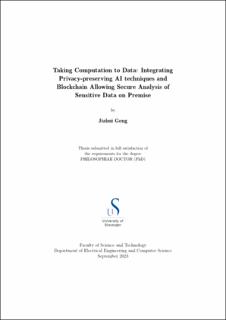Taking Computation to Data: Integrating Privacy-preserving AI techniques and Blockchain Allowing Secure Analysis of Sensitive Data on Premise
Doctoral thesis
Permanent lenke
https://hdl.handle.net/11250/3086242Utgivelsesdato
2023Metadata
Vis full innførselSamlinger
- PhD theses (TN-IDE) [23]
Originalversjon
Taking Computation to Data: Integrating Privacy-preserving AI techniques and Blockchain Allowing Secure Analysis of Sensitive Data on Premise by Jiahui Geng, Stavanger : University of Stavanger, 2023 (PhD thesis UiS, no. 710)Sammendrag
With the advancement of artificial intelligence (AI), digital pathology has seen significant progress in recent years. However, the use of medical AI raises concerns about patient data privacy. The CLARIFY project is a research project funded under the European Union’s Marie Sklodowska-Curie Actions (MSCA) program. The primary objective of CLARIFY is to create a reliable, automated digital diagnostic platform that utilizes cloud-based data algorithms and artificial intelligence to enable interpretation and diagnosis of wholeslide-images (WSI) from any location, maximizing the advantages of AI-based digital pathology.
My research as an early stage researcher for the CLARIFY project centers on securing information systems using machine learning and access control techniques. To achieve this goal, I extensively researched privacy protection technologies such as federated learning, differential privacy, dataset distillation, and blockchain. These technologies have different priorities in terms of privacy, computational efficiency, and usability. Therefore, we designed a computing system that supports different levels of privacy security, based on the concept: taking computation to data. Our approach is based on two design principles. First, when external users need to access internal data, a robust access control mechanism must be established to limit unauthorized access. Second, it implies that raw data should be processed to ensure privacy and security. Specifically, we use smart contractbased access control and decentralized identity technology at the system security boundary to ensure the flexibility and immutability of verification. If the user’s raw data still cannot be directly accessed, we propose to use dataset distillation technology to filter out privacy, or use locally trained model as data agent. Our research focuses on improving the usability of these methods, and this thesis serves as a demonstration of current privacy-preserving and secure computing technologies.
Beskrivelse
PhD thesis in Information technology
Består av
Paper 1: Rong, C., Geng, J., Hacker, T.J., Bryhni, H., Jaatun, M.G. (2022) OpenIaC: open infrastructure as code-the network is my computer. Journal of Cloud Computing: Advances, Systems and Applications, 11:12. DOI: 10.1186/s13677-022-00285-7Paper 2: Geng, J., Mou, Y., Li, Q., Li, F., Beyan, O., Decker, S., Rong, C. (2023) Improved Gradient Inversion Attacks and Defenses in Federated Learning. IEEE Transactions on Big Data. DOI: 10.1109/TBDATA.2023.3239116. This paper is not included in the Brage repository due to copyright restrictions.
Paper 3: Geng, J., Chen, Z., Wang, Y., Woisetschläger, H., Schimmler, S., Mayer, R., Zhao, Z., Rong, C. (2023) A Survey on Dataset Distillation: Approaches, Applications and Future Directions. Proceedings of the Thirty-Second International Joint Conference on Artificial Intelligence (IJCAI-23), Macao, China, 2023. This paper is not included in the Brage repository due to copyright restrictions.
Paper 4: H. Tadjik, J. Geng, M. G. Jaatun and C. Rong (2022) Blockchain Empowered and Self-sovereign Access Control System, 2022 IEEE International Conference on Cloud Computing Technology and Science (CloudCom), Bangkok, Thailand, 2022, pp. 74-82, doi: 10.1109/CloudCom55334.2022.00021. This paper is not included in the Brage repository due to copyright restrictions.
Paper 5: J. Geng, A. A. Rehman, Y. Mou, S. Decker and C. Rong (2022) Blockchain-based Cross-organizational Workflow Platform, 2022 IEEE International Conference on Cloud Computing Technology and Science (CloudCom), Bangkok, Thailand, 2022, pp. 53-59, doi: 10.1109/CloudCom55334.2022.00018. This paper is not included in the Brage repository due to copyright restrictions.
Utgiver
University of Stavanger, NorwaySerie
PhD thesis UiS;;710
